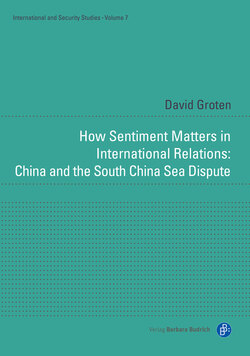Читать книгу How Sentiment Matters in International Relations: China and the South China Sea Dispute - David Groten - Страница 32
На сайте Литреса книга снята с продажи.
[58] 2.4 Think Tanks as Research Subjects
ОглавлениеIn theory, a whole range of different methodological research subjects appears feasible to conduct the research project’s single case study research. For instance, it may be possible to examine any kinds of documents likely to contain discursive manifestations of disrespect and respect expectations such as political speeches by Chinese government officials, PRC strategy papers, media articles by the leading Chinese mouthpieces (such as Xinhua News Agency) and others. PRC documents naturally reflect official party/government line and position commonly adopting official public diplomacy wording86 and tend not to go into details regarding certain South China Sea policy issues but offer somewhat limited and rather pragmatic insights into different facets of ‘China’s political psyche’ with regard to face, respect needs and expectations. As mentioned previously, the project at hand scrutinizes expert or elite discourses by two of the most prestigious Chinese foreign policy think tanks (FPTTs)87 instead, the China Institutes of Contemporary International Relations (CICIR) and the China Institute of International Studies (CIIS).
The reasons for examining elite think tank discourses are manifold. In general, scientific policy advice and political counseling play an ever-increasing role for national governments and political decision-makers around the globe (Jasanoff, 2009; Wilsdon & Doubleday, 2013). As a result, the significance of think tanks in (particularly U.S.) foreign policy-making has received considerable academic attention during the last two decades (Abelson, 2006; Higgot & Stone, 1994; Parmar, 2004; Stone & Denham, 2004). It is agreed that roles, objectives and ultimately influence of a given think tank depend on its specific structure and the context it operates in (Glynn et al., 2002; Stilgoe et al., 2014). For instance, a think tank may constitute an independent institution (financially and/or by structure) or can be affiliated with an official state body, a corporation, an international foundation or a university. Moreover, a think tank may be structured as a permanent body or [59] as an entity operating on an ad hoc basis88. Consequently, scholars widely differ in their understanding and definition as to what constitutes a think tank. This is manifested in the whole bunch of terminologies and labels such as research institutes, intelligence agencies, knowledge actors, research centers, academic institutes and policy analysis institutes that circulate. For the sake of clarification, the McGann’s definition is shared by the author:
“[P]ublic-policy research analysis and engagement organizations that generate policy-oriented research, analysis, and advice on domestic and international issues, thereby enabling policymakers and the public to make informed decisions about public policy“ (2012, p. 8).
The key objectives of (foreign policy) think tanks are regarded as follows: to inform and advice government bodies (on matters of foreign and security policy), corporations or the civil society on complex political issues in an understandable and reliable manner. In this vein, think tank discourses are anticipated to differ from political and other discourses. That said, regardless of its direct affiliation to party or government bodies, think tanks are generally presumed to occupy a more (scientifically) reflected, critical (within certain boundaries), blunt instead of symbolic, and at times visionary position than political discourses. Politicians must weigh every word and behave in a more pragmatic, reactionary and diplomatic manner, not least due to the necessity to legitimize their actions. Likewise, official speeches frequently adopt, particularly in China, a very diplomatic language instead of providing notable insights into the perceptions and individual assessments of the speaker in question. In contrast, think tank discourses presumably contain a higher level of pluralism of opinions compared to political discourses. At the same time, very similar to political discourses, think tank discourses are capable of initiating, steering and dominating certain discourses and narratives89 and thereby influencing foreign policy agendas and preferences to a certain degree90. As a result, a close analysis of think tank discourses is deemed a reasonable and feasible approach in consideration of the project’s core objective of tracing and examining discursive manifestations of disrespect and respect expectations beyond the symbolic and/or instrumental level.
